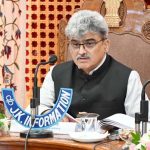Mussoorie, Nov 27: Inaugurating the 7th batch of the Capacity Building Programme in Field Administration for senior officers of the Jammu & Kashmir Administrative Service (JKAS) at Lal Bahadur Shastri National Academy of Administration (LBSNAA) in Mussoorie, Union Minister Dr Jitendra Singh on Monday urged officers to play a pivotal role in implementing and catalyzing the Centre’s governance reforms in the region.
Dr Singh, who is also Incharge DoPT to which LBSNAA is affiliated, said, “I appeal to you to be catalysts of Centre’s governance reforms introduced by PM Narendra Modi and help their effective implementation in Jammu & Kashmir.”
The Union Territory of Jammu & Kashmir and the unexplored North-Eastern Region (NER) have huge natural resources that would drive India’s future growth story during the Amrit Kaal towards attaining a Viksit Bharat @ 2047, the minister said, adding that the value addition to India’s growth is going to come from these unexplored regions during the next 25 years.
The Union Minister of State (Independent Charge) Science & Technology; MoS PMO, Personnel, Public Grievances, Pensions, Atomic Energy and Space said the success of Aroma Mission and Purple Revolution in Bhaderwah and Gulmarg regions of J&K has resulted in over 3,000 StartUps engaged in Lavender cultivation alone. He said Uttarakhand and Himachal Pradesh have sent delegations to J&K to study the Lavender cultivation model and have evinced interest in emulating the Aroma Mission.
Dr Jitendra, who represents the Udhampur constituency of J&K in the Lok Sabha, said the discovery of Lithium in Reasi district may well turn out to be “India’s next big story”, giving a multifold boost to the country’s economy. “Analysis suggests that the value of Lithium deposits in Reasi may be higher than in China,” he said, stating that Lithium is a key component in rechargeable batteries and there is huge demand for Lithium as the world turns to renewable energy.
Stating that an increasing number of items from J&K have been geo-tagged, Dr Singh called upon the J&K Administration officers to promote sales of GI-tagged products from the UT to boost the local economy.
“Ever since Prime Minister Narendra Modi took office in 2014, he has made it a commitment to bring the neglected and remote regions of India including J&K, Ladakh, islands and the NER to the national mainstream,” he said.
PM Modi has “walked the talk”, the union minister said, pointing out that J&K today has an express corridor, the tallest rail bridge that would soon link the Kashmir Valley with the railway network and a number of projects of national importance have been fast-tracked, ensuring that development touches the lives of citizens of J&K.
He said PM Modi has introduced several Governance Reforms towards the socio-economic uplift of people. Public policy in our country is currently aimed at enhanced transparency and accountability in governance with a focus on fiscal federalism, transforming rural India, and improving the quality of public service delivery, he said.
Dr Singh the Central Government grievance redressal system, CPGRAMS, has been made more responsive and relevant, achieving a disposal rate of 97%. He said the J&K GRAMS portal has been integrated with the CPGRAMS for seamless grievance redressal between the Central and UT administrations.
Speaking on the occasion, V. Srinivas, Secretary, DARPG said more than 280 J&K Administrative Service officers have visited NCGG. He said the workshop is part of an MoU signed in 2019 between the J&K Administration and NCGG to train 500 J&K Cadre officers in a 5-year period.
The 7th Capacity Building Programme is being conducted from November 27, 2023, to December 08, 2023, at NCGG, Mussoorie. The programme is being attended by 26 of the JKAS working in the ranks of Secretaries, Special secretaries, Additional Secretaries, CEOs, Directors, Joint Directors and Development Officers among others.
During this programme, civil servants of Jammu & Kashmir will interact with the domain experts on diverse topics, viz., communication strategies, poverty elimination, Rural Housing, Skill India, Artificial Intelligence in Government, Tourism & Culture, Jal Jeevan Mission, DIGITAL INDIA, approach to SDGs by 2030, Ayushman Bharat, anti-corruption strategies, vigilance administration, circular economy, rejuvenation of rivers, innovation & entrepreneurship, etc. among other important areas. The participants will also be taken on an exposure visit to Indian Parliament.










